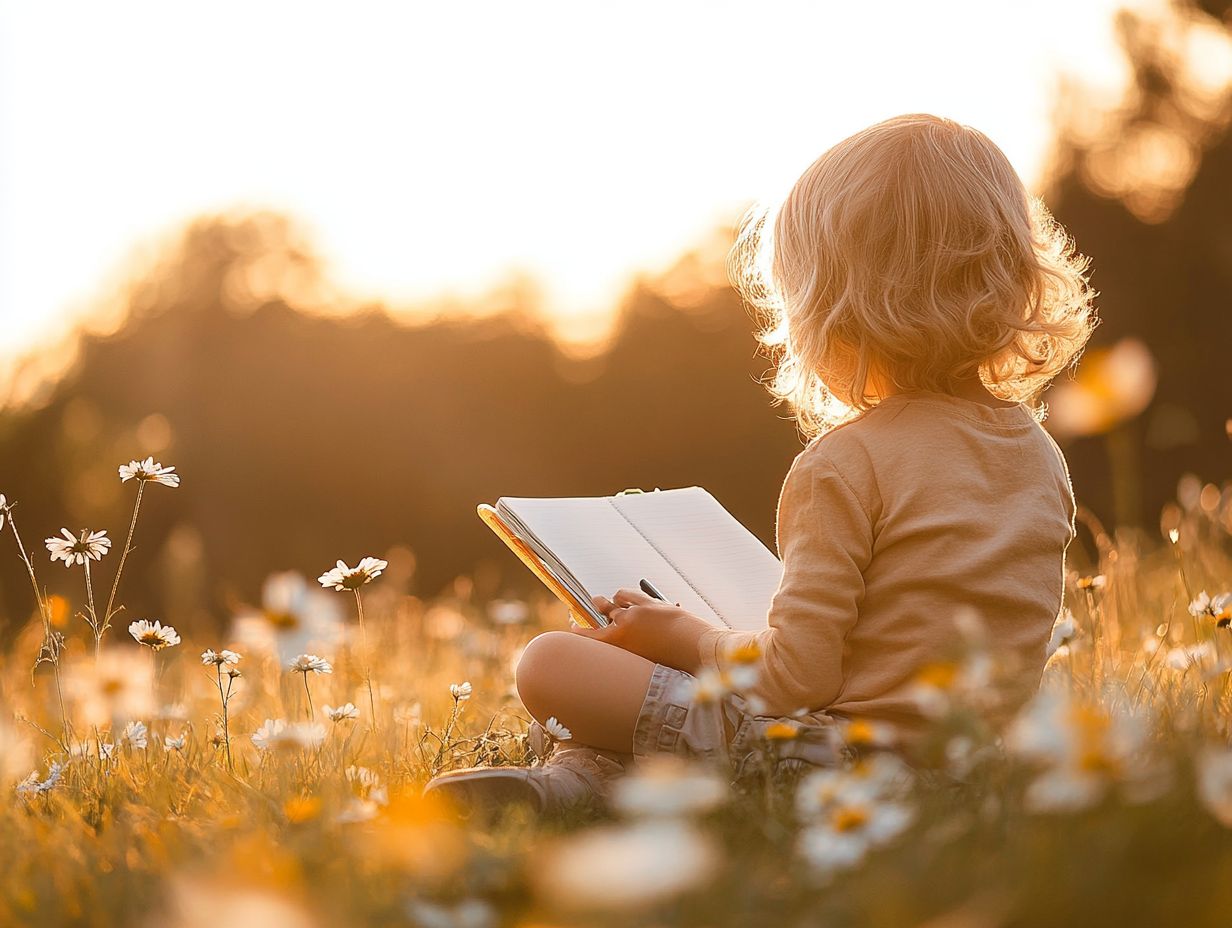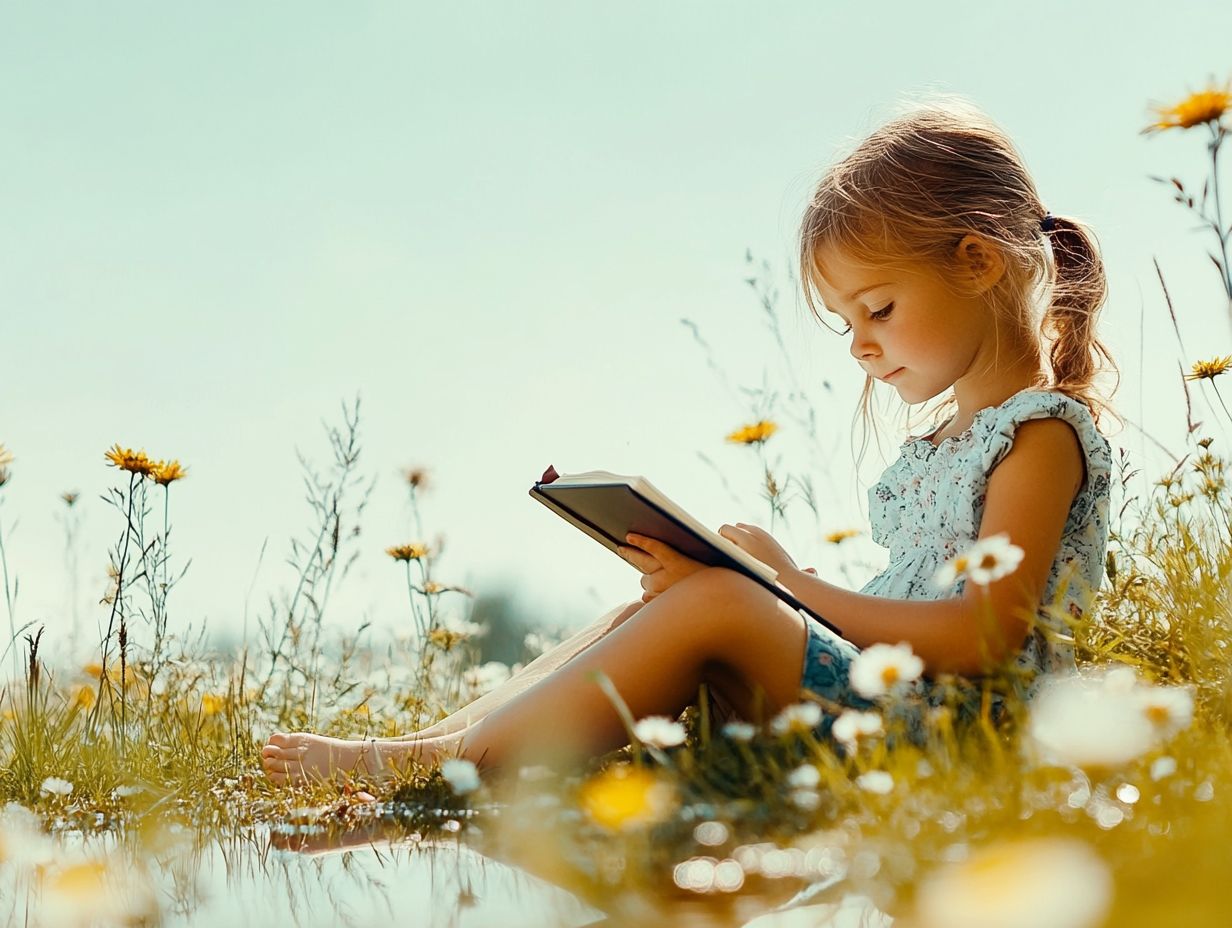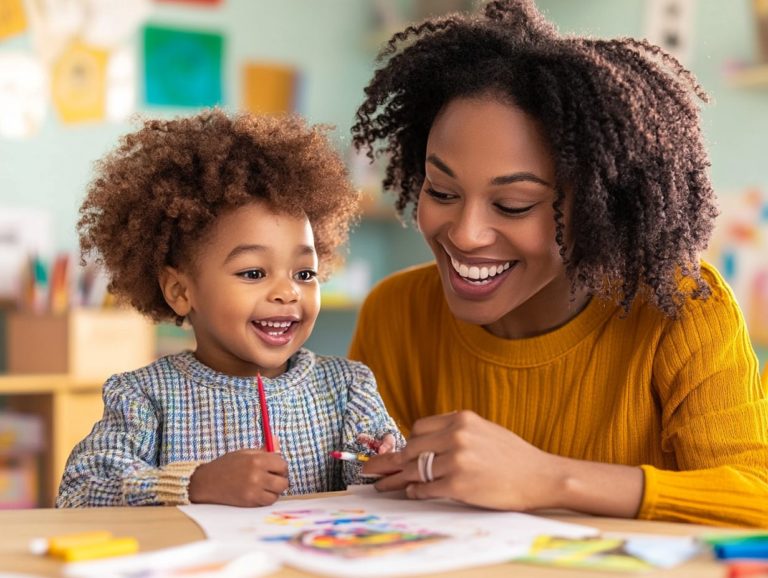How to Encourage Reflection in Your Child
Reflection serves as a profound instrument in enhancing a child’s development, cultivating vital skills such as self-awareness, emotional intelligence, and resilience. These reflective skills are crucial for navigating the complexities of early childhood education and family dynamics.
This exploration delves into the essence of reflection and its significance for your child’s growth. You’ll uncover practical strategies to foster reflective practices at home, ranging from serene moments of contemplation to dynamic activities like nature walks and creative art projects, which are essential for teaching self-reflection and understanding feelings.
By nurturing the practice of reflection, you can unlock lasting benefits that will shape your child’s future in meaningful ways.
Contents
- What is Reflection?
- Why is Reflection Important for Children?
- How can Parents Encourage Reflection in their Children?
- What are Some Activities that Promote Reflection in Children?
- How Can Reflection Benefit Children in the Long Run?
- 3. Enhanced Learning and Retention
- 4. Increased Resilience and Coping Skills
- Frequently Asked Questions
- What is reflection?
- How can I encourage my child to reflect on their experiences?
- Is it important to model reflection for my child?
- How can I make reflection a regular part of my child’s routine?
- What are some benefits of encouraging reflection in children?
- Supporting Your Child in Learning from Mistakes
Key Takeaways:

- Encourage quiet reflection time for your child to process their thoughts and emotions.
- Model reflective behavior by sharing your own experiences and asking open-ended questions.
- Engage in activities like nature walks and art projects to promote reflection and problem-solving skills in your child.
What is Reflection?
Reflection is the mindful process of thinking about your own thoughts, feelings, and actions, ultimately enhancing your emotional intelligence and understanding of emotions.
This practice is crucial in fostering self-awareness and emotional control, enabling you to articulate your feelings clearly and navigate your social and emotional development with confidence.
Why is Reflection Important for Children?
Reflection holds significant importance for children, as it nurtures their emotional well-being and plays a pivotal role in their social and emotional development, especially in challenging circumstances like pediatric cancer.
By engaging in reflective practices, children can sharpen their problem-solving skills, cultivate a growth mindset, and enhance their self-awareness essential tools for effectively navigating their learning journey.
How can Parents Encourage Reflection in their Children?
You have an exciting opportunity to inspire reflection in your children by creating a supportive environment that addresses their emotional needs and promotes effective reflective parenting strategies, including reflective functioning and honest communication.
By incorporating planned activities that allow safe exploration and facilitate open communication, you can guide your children through daily reflections, ultimately enhancing their empathy and self-awareness.
1. Allow Time for Quiet Reflection
Allowing time for quiet reflection is an essential step in nurturing emotional development. It gives you the chance to engage in mindfulness practices that enhance self-expression and deepen your understanding of feelings, which are crucial for behavior management and reflective functioning.
In today s fast-paced world, carving out moments for stillness is more crucial than ever. Techniques like meditation or journaling can become powerful allies in this endeavor, helping you process your thoughts and emotions more effectively, thereby aiding in the learning process.
During these tranquil moments, you can explore your inner landscape, fostering greater self-awareness and emotional intelligence. For instance, guided meditation designed specifically for children not only helps you learn how to focus but also encourages you to articulate your feelings clearly.
Journaling offers a safe space for expressing your thoughts, cultivating creativity and personal insight. By incorporating these practices into your routine, you can nurture resilience and promote a healthier emotional landscape for yourself, your family members, and younger generations.
Start practicing these reflection strategies with your child this week and watch them thrive!
2. Show Reflective Behavior
Showing reflective behavior is crucial for you as a parent. It showcases accountability and emotional intelligence, providing a powerful example for your children to follow in their lives, including their academic performance and social development.
By incorporating practices such as open discussions about feelings and daily experiences, you can create a safe environment that encourages self-expression. For instance, sharing your personal reflections on challenging situations whether it s a tough day at work or a disagreement with a friend teaches your children the significance of processing their emotions.
Encouraging your children to ask questions about their feelings fosters curiosity and self-awareness. By demonstrating a willingness to learn from mistakes, you promote a growth mindset, reinforcing the idea that setbacks are simply opportunities for growth. This approach cultivates resilience and equips your children with essential tools to navigate their emotional landscapes effectively. It ultimately enhances their problem-solving skills and learning journey.
3. Ask Open-ended Questions

Asking open-ended questions is a powerful strategy for enhancing communication and encouraging your children to explore their feelings in a nurturing environment. This addresses their emotional needs and promotes reflective parenting.
This approach cultivates a safe space for discussing emotions, allowing your children to articulate their thoughts and feelings more profoundly. Instead of simply asking, “Did you have fun at school today?” consider posing the question, “What was the best part of your day at school?” This opens the door for a more detailed response and invites your child to reflect on their personal experiences and emotions, enhancing their reflective functioning.
By engaging in this way, you help your children identify their feelings be it joy, frustration, or curiosity ultimately leading to improved emotional intelligence. This method strengthens your communication with them and equips them with essential skills to navigate their complex emotions and develop empathy towards others.
4. Encourage Journaling or Writing Activities
Encouraging your children to engage in journaling or writing activities is a powerful way to help them articulate their thoughts and feelings. This fulfills their emotional needs and enriches their self-expression.
By incorporating regular writing practices, your children can cultivate a deeper emotional awareness, which is vital for navigating the complexities of their feelings and experiences. As they transform abstract emotions into tangible words, they gain clarity and understanding about what they are experiencing.
You can seamlessly weave these beneficial activities into daily routines by introducing engaging prompts, such as “What made you smile today?” or “Describe a time you faced a challenge and how you overcame it.” Methods like visual journaling or storytelling can also spark creativity, making the process both enjoyable and impactful.
These practices promote reflection and encourage meaningful conversations between you and your children. This enhances emotional connection and provides crucial support, including private tutoring and caregiver connections.
5. Use Reflection as a Tool for Problem Solving
Using reflection as a problem-solving tool is an exciting way to boost your child’s skills and foster emotional control during challenging situations, such as serious illness or pediatric cancer. When they take the time to ponder their experiences, they start to recognize patterns and outcomes, which sharpens their ability to navigate future challenges.
You can play a pivotal role in this developmental journey by encouraging your child to ask open-ended questions about their experiences. Prompt them to articulate their thoughts and feelings. Techniques like journaling, guided discussions, and role-playing scenarios create a safe space for reflection, promoting self-reflection and enhancing their emotional well-being.
Through supportive dialogue, your child will learn to tackle problems with a more analytical mindset. They will also cultivate resilience as they realize that setbacks are a natural part of the learning process, providing growth opportunities that enhance their overall development.
Start today by trying these reflective practices with your child!
What are Some Activities that Promote Reflection in Children?
Reflection is an essential part of emotional development for children. Engaging in activities that promote reflection helps children understand their feelings, build resilience, and connect with themselves and others. You have a wealth of activities at your disposal that can encourage reflection in children, all designed to enhance their emotional well-being and support their development.
By engaging in structured activities and mindfulness exercises, you can create a nurturing environment that fosters growth and self-awareness.
1. Nature Walks
Nature walks are a fantastic way for children to explore their feelings and connect with nature. They offer an exceptional opportunity to engage in mindfulness practices that can significantly enhance emotional intelligence and deepen connections with the environment.
As children venture outdoors, they allow their senses to be enveloped by the beauty around them, fostering a sense of wonder and curiosity that is vital in childhood. Strolling through lush forests or alongside serene trails provides ample time for quiet reflection, which is crucial for emotional growth and developing a tranquil mindset.
Being immersed in nature encourages self-exploration and helps build resilience as children learn to navigate their feelings in a peaceful setting. This also enhances their ability to think about and understand their own feelings.
The fresh air and soothing sounds of the natural world create a tranquil mindset, making it easier for children to understand their emotions and develop empathy towards others.
2. Art Projects
Art projects serve as a powerful means of self-expression, offering children the opportunity to communicate their feelings and cultivate emotional control through creative outlets. This form of reflection can also enhance their social and emotional development.
When children engage in activities such as painting, drawing, or sculpting, they explore and articulate their internal experiences, leading to a richer understanding of their emotions. For instance, crafting a personal collage from magazines allows them to identify and reflect on the themes that resonate in their lives, facilitating a dialogue between their conscious thoughts and feelings. This could be life-changing for children facing challenges like pediatric cancer, as it offers a therapeutic outlet.
Collaborative endeavors like mural painting create an environment for teamwork and empathy. Children learn to appreciate diverse perspectives while striving toward a shared objective. These experiences not only enhance their emotional literacy but also foster resilience and self-awareness, ultimately paving the way for healthier emotional expression and communication.
3. Group Discussions

Group discussions offer children a valuable opportunity to practice communication, enhance empathy, and develop reflective skills through shared experiences, thus supporting both social and emotional development.
In these settings, children learn to navigate differing perspectives, which encourages them to articulate their thoughts clearly while also actively listening to others. This exchange nurtures a sense of belonging among peers. When children are invited to share their feelings or experiences in a safe environment, they are more likely to engage in meaningful reflections that reinforce their interpersonal skills and reflective behavior.
Such discussions are essential tools for emotional intelligence, helping children recognize and validate their own emotions while remaining sensitive to the feelings of others. Ultimately, this dynamic interaction cultivates a community of support and understanding, beneficial for both personal growth and the collective harmony around them, including family dynamics.
4. Mindfulness Exercises
Mindfulness exercises are powerful tools that can greatly enhance emotional well-being, guiding you to help children develop their reflective functioning and self-awareness, essential for their overall emotional and social development.
By engaging in simple activities like mindful breathing, guided imagery, or body scans, you can create an environment that nurtures a child’s ability to recognize and manage their emotions. These practices do more than just promote calm; they build resilience by enabling young individuals to delve deeper into their thoughts and feelings, thus improving emotional regulation.
For example, when children take part in mindful storytelling, they not only sharpen their listening skills but also learn to empathize with different perspectives, which significantly enhances their social interactions. Ultimately, weaving mindfulness into daily routines can lead to remarkable improvements in a child’s emotional regulation and reflective abilities, equipping them with essential life skills for the future, including introspection and emotional control.
How Can Reflection Benefit Children in the Long Run?
Reflection provides a wealth of long-term benefits for children, fostering enhanced self-awareness, emotional intelligence, and resilience. These qualities significantly enrich their decision-making skills and emotional well-being.
These qualities significantly enrich their decision-making skills, shaping them into thoughtful individuals throughout their lives, aiding their social development and emotional growth.
1. Improved Self-awareness and Emotional Intelligence
Engaging in reflective practices can profoundly enhance your child’s self-awareness and emotional intelligence, providing them with invaluable opportunities for growth and self-reflection.
This process invites them to think critically about their thoughts, emotions, and behaviors, helping them gain a clearer understanding of their own experiences as well as the feelings of others, including understanding the emotions of those around them.
By regularly reflecting on their interactions and outcomes, they cultivate a deeper awareness of their strengths and areas for improvement. This reflection nurtures emotional intelligence, equipping them with essential tools to manage their emotions, understand feelings, and forge strong relationships.
As they navigate their feelings and reactions, they build resilience an essential component for their overall development and well-being. Incorporating reflective practices into their daily lives can significantly enrich their personal and social skills, contributing to better emotional development.
2. Better Decision Making Skills
Children who take the time to reflect cultivate superior decision-making skills, as they learn to analyze situations and apply problem-solving techniques rooted in their experiences, thus improving their overall emotional and social well-being.
This reflective process often involves revisiting past choices, assessing their outcomes, and critically contemplating alternative actions. For example, when a child faces a conflict with a friend, reflecting on their behavior allows them to discern what worked and what fell short. By posing questions like, “How did my words impact my friend?” or “What could I have communicated differently?“, they uncover valuable insights that inform future interactions and contribute to a growth mindset.
Engaging in such reflective practices not only enhances emotional intelligence but also empowers children to navigate decisions with greater confidence, as they learn to trust their judgment, shaped by personal experiences and the lessons they ve embraced along the way.
3. Enhanced Learning and Retention
Through reflective practices, you can significantly enhance your learning and retention. This allows you to better understand and integrate new information into your child development journey. This process nurtures critical thinking and encourages you to connect your prior knowledge with new concepts. As a result, you deepen your comprehension and promote a holistic learning journey.
Employing techniques such as guided journaling, group discussions, and self-assessment can help articulate your thoughts and feelings about what you encounter. By regularly reflecting on your experiences, you cultivate thinking about how you think, enabling you to identify strengths and areas for improvement. This enriches your learning process.
Educators play a vital role in facilitating these reflections by creating a safe environment that promotes open dialogue and exploration. This ultimately leads to more meaningful learning experiences and enhanced performance, contributing to academic success.
4. Increased Resilience and Coping Skills

Reflection enhances your resilience and coping skills, empowering you to tackle challenges and emotional adversities more effectively.
By engaging in reflective practices, you learn to process your experiences, recognize your emotions, and cultivate a deeper understanding of your reactions to various situations. For example, activities like journaling allow you to articulate your feelings and thoughts, transforming overwhelming emotions into manageable insights.
Mindfulness exercises, such as deep breathing or guided imagery, encourage a reflective state that helps you focus on the present moment. This reduces anxiety and fosters emotional stability, which is essential for emotional well-being.
These strategies promote emotional well-being and nurture a resilient mindset, equipping you with essential tools to confidently navigate life’s ups and downs. This, in turn, improves your emotional control.
Frequently Asked Questions
What is reflection?
Reflection is the process of thinking deeply about an experience or event and understanding its significance. It is important for children because it helps them make sense of their experiences, learn from them, and develop self-awareness and critical thinking skills. These are pivotal for their emotional and social development.
How can I encourage my child to reflect on their experiences?
One way to encourage reflection in your child is to ask open-ended questions about their experiences, such as “What did you learn from that?” or “How did that make you feel?” This prompts them to think more deeply about their experiences and share their thoughts with you, supporting their self-reflection and emotional development.
Is it important to model reflection for my child?
Yes, children learn by observing their parents and caregivers. If you model reflection by sharing your own thoughts and feelings about a situation, your child is more likely to do the same. It also shows them that reflection is a valuable and normal process, promoting reflective parenting.
How can I make reflection a regular part of my child’s routine?
You can make reflection a daily or weekly practice by setting aside time to talk about your child’s experiences and what they have learned from them. Use mealtime as a great opportunity to talk! This can also be done before bed or during a designated “reflection time” each day. Daily reflections reinforce the habit of self-reflection and emotional awareness.
What are some benefits of encouraging reflection in children?
Encouraging reflection in children helps them develop empathy, problem-solving skills, and self-awareness. It can also improve their ability to learn from their experiences and make better decisions in the future, contributing to a comprehensive learning journey for their overall development.
Start reflecting with your child today and explore more resources to enhance their reflective practices!
Supporting Your Child in Learning from Mistakes
Create a safe and encouraging environment for your child. This allows them to reflect on their mistakes and failures.
Encourage them to think about what they could have done differently and what they learned from the experience. Remind your child that making mistakes is a normal part of learning and growth.
Creating a supportive space fosters accountability and understanding of emotions.






